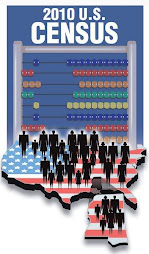Suit seeks larger Congress, reports Clarion Ledger
OXFORD - If a federal complaint filed here on Thursday is successful, the U.S. House of Representatives could drastically increase to give Mississippi and other states more representation, but at a cost of millions of dollars to taxpayers.
Oxford native John Tyler Clemons filed the suit with registered voters from Montana, South Dakota, Delaware and Utah. Defendants are the U.S. Commerce Secretary Gary Locke; Robert Groves, director of the Census Bureau; and Lorraine Miller, clerk of the U.S. House of Representatives.
The lawsuit comes as promotional plans are in the works for the upcoming census. Census Day is April 1, 2010.
In the last census count, in 2000, Mississippi lost a U.S. House seat because its pace of growth didn't match that of other states, according to the census.
According to the lawsuit, Mississippi is under represented by 10.24 percent. For example, there are four districts each averaging 713,232 persons in Mississippi, while West Virginia has three districts averaging 604,359 persons.
"This under representation violates the constitutional standards for one-person, one-vote," the lawsuit, filed by Washington-based attorney Michael Farris, argues.
The number of representatives in the House currently is fixed at 435.
Two proposed apportionment plans based on the 2000 census are suggested in the lawsuit. Both would change the "ideal" size of a district from 646,952 people to either 159,809 or 301,957 people. Plan A would make the current number of representatives 1,761; while Plan B would increase the number of representatives to 932.
Clemons, a University of Mississippi student and former editor of the school newspaper, said he wants to fight for the under represented people in his state.
"Our Constitution was crafted around the idea that all citizens deserve an equal voice in the decisions of their government," Clemons said. "... If someone's vote in Iowa or Wyoming counts for more than mine, how is that equality?"
A spokesperson for the clerk of the U.S. House said his office had received the complaint, but would not comment on it.
Spokesmen for the Bureau of Census and the Department of Commerce did not return calls for comment.
Some, including 3rd District Republican Rep. Gregg Harper of Pearl, think the restructuring would cost too much money.
With rank-and-file members earning $174,000 per year, taxpayers pay more than $75 million per year total in salaries. If there were 932 congressmen, the overall amount would increase to more than $162 million. If there were 1,761 representatives, the total taxpayer cost could be more than $300 million.
"Clearly, this concept would greatly increase the size and cost of our federal government at a time when we should be reducing spending," Harper said.
But Scott Scharpen, who spearheaded the suit, suggests each representative has too many staff members. By reducing the size of staffs, money could be opened up for more representatives, he said.
Scharpen also said earmarks would be harder to get if there were more districts, making more money available for representatives' salaries.
Ole Miss constitutional law professor George Cochran calls the suit "innovative," but questions how successful it will be.
"I'm not sure the right defendants are being sued," Cochran said. "There are a lot of procedural hurdles that could lead to a dismissal."
Cochran said he wasn't sure who the right defendant would be until he did more research. He said, however, the federal courts may not want to make a ruling on this case because typically the judicial branch cannot tell the legislative what to do and vice-versa.
It would be like a federal judge ruling the war in Iraq is unconstitutional, Cochran said. "That's just not going to happen," he said.
Cochran also believes the court would take into consideration the cost, as well as how difficult the restructuring would be if the lawsuit were successful.
Norman Ornstein, a congressional scholar at the Washington, D.C.-based American Enterprise Institute, also doesn't think the lawsuit will prevail. He said Congress would be unlikely to support adding more districts because it would decrease representatives' power.
Ornstein said the congressional system, unlike a Parliamentary system, is built so representatives can have face time with their constituents, and if you added more districts, face time would be much harder.
"On the other hand, with these dramatic disparities, we might need to think of other ways (to obtain) one-person, one vote. ... Maybe by adding at-large seats," Ornstein said.
Although a census is done every 10 years to reappropriate congressional seats, it doesn't add more than the 435 seats allowed. Scharpen said, as areas become more populated they should add more seats to Congress.
"If this lawsuit is successful," Scharpen said in the release, "the court will require an increase in House membership to achieve appropriate voter equality across America, and bring about perhaps the most significant change in the federal government structure in nearly a century."
Subscribe to:
Post Comments (Atom)

How does Ornstein figure it would be harder for Representatives to have face time with their constituents if more districts were added? If we had more Districts the area would decrease and Representatives would log fewer miles. Which would result in more face time.
ReplyDeleteAs to the lawsuit, seems to me the state level is the place to start. Sue the state for improved representation and force WA DC to find room for more Representatives in the House.